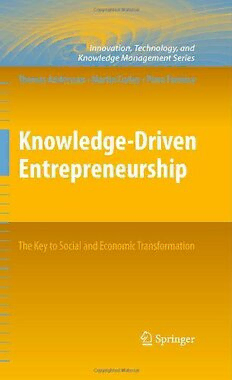
Knowledge-Driven Entrepreneurship: The Key to Social and Economic Transformation PDF
260 Pages·2010·10.675 MB·English
Most books are stored in the elastic cloud where traffic is expensive. For this reason, we have a limit on daily download.
Preview Knowledge-Driven Entrepreneurship: The Key to Social and Economic Transformation
Description:
The current economic era, characterized by the rapid and global dissemination of information and capital, has been called the "knowledge age," the "entrepreneurial society," and the "intangibles economy," among other labels. Technological and productivity improvements continue to shift the emphasis from the mastery of physical assets (e.g., natural resources, factories) and physical tools (e.g., machines) to that of intangible assets (e.g., education, R&D projects, brands, patents) and socio-cultural tools (e.g., communities of knowledge practice) as the key to a community’s economic prosperity. The purpose of this book is to build a bridge between knowledge and entrepreneurship, which have traditionally been separated by the walls of academic disciplines. Building on the pioneering work of Peter Drucker and William Baumol, the authors explore the intricate relationships among knowledge generation, innovation, new business creation, and the institutions that support them. Demonstrating direct links between the flow and application of knowledge, innovations in products and processes, the development of new enterprises, and generation of economic wealth, the authors strongly argue that these assets must be protected and sustained through national and regional institutions that encourage creativity and experimentation. Employing illustrative examples from around the world, the authors focus on the crucial role of societies to educate and support entrepreneurs and establish the right environment for new business development and rapid conversion of ideas into enterprises that contribute to economic growth and prosperity.
See more
The list of books you might like
Most books are stored in the elastic cloud where traffic is expensive. For this reason, we have a limit on daily download.
